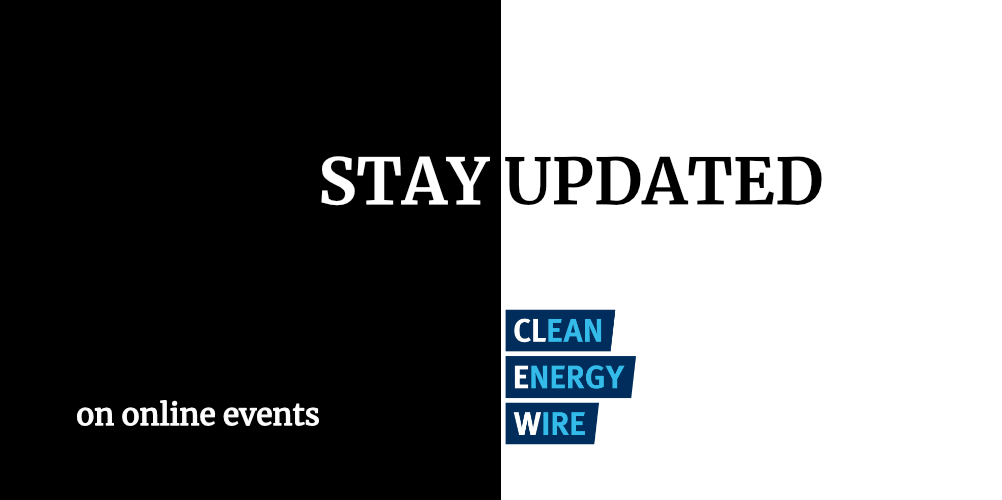
Milou Dirkx is Lead Network & Media Programmes at Clean Energy Wire.
Stay updated on online journalism and energy events
LAST UPDATE 23/02
[Updated with webinars from FSR, IISD]
| 24/02, 14.00 CET | Webinar - Innovation Landscape for Sustainable Development Powered by Renewables Organiser: International Renewable Energy Agency (IRENA) The global energy transition presents considerable opportunities to transform and modernise energy systems across the globe. All regions have much to gain from this transition, making it possible to create resilient and affordable low-carbon energy systems and provide universal access to electricity. The development of renewables can be a catalyst for ensuring a equitable transition for all, as well as sustainable development, in particular in emerging markets and developing economies (EMDEs). IRENA's innovation flagship report maps the innovation landscape for sustainable development powered by renewables in a systemic way and identifies 40 innovations that policymakers can strategically combine to build solutions for two urgent goals: building resilient power systems and expanding energy access while driving inclusive local development. You can find more information here and register via this link. |
| 25/02, 14.00 CET | Webinar - Designing Better and Fairer Border Carbon Adjustments Organiser: International Institute for Sustainable Development (IISD) This webinar will feature a panel discussion aiming to advance global discussions on key design challenges and opportunities related to border carbon adjustments, with a focus on building a common understanding of trade-offs, risks, and possible areas of convergence among policy-makers, civil society, and other stakeholders. You can find more information here and register via this link. |
| 25/02, 14.30 CET | Webinar - Unlocking Europe’s geothermal potential Organiser: Florence School of Regulation (FSR) This online debate centres on the launch of GeoMap Europe, a new continent-wide geothermal mapping platform developed by Project InnerSpace, which integrates millions of subsurface data points into an open, accessible visualisation of Europe’s geothermal resources. The discussion will examine how GeoMap Europe can help overcome information and risk barriers, support the implementation of EU climate and energy legislation, and accelerate geothermal deployment in line with the European Green Deal and revised Renewable Energy Directive. Speakers will reflect on policy, regulatory, and market implications, including permitting acceleration, heat planning, and the role of geothermal in strengthening Europe’s energy independence. You can find more information here and register via this link. |
| 26/02, 11.30 CET | Webinar - Climate Finance: From negotiations to implementations Organiser: International Institute for Sustainable Development (IISD) Climate finance remains a critical enabler of global climate ambition, yet the current finance flows still fall short of developing countries’ needs. Developing economies require trillions of dollars annually to meet mitigation and adaptation goals. India alone is estimated to need around USD 170 billion per year to achieve its climate targets, while global public climate finance remains below agreed targets. The 30th UN Climate Change Conference (COP 30) prioritized operationalizing the New Collective Quantified Goal on Climate Finance (NCQG), with the Baku–Belém roadmap aiming to mobilize USD 1.3 trillion for developing countries through public and private finance. Adaptation finance also gained renewed focus, including calls to scale support by 2035 and improve tracking. However, concerns remain on credibility, delivery, and access to funds. Beyond the United Nations Framework Convention on Climate Change process, the G20 Johannesburg Summit underscored the need to move “from billions to trillions,” highlighting the importance of multilateral development bank (MDB) reform, concessional finance, and risk-sharing instruments to unlock capital at scale. This webinar, hosted jointly by the International Institute for Sustainable Development and the Indian Institute of Management – Calcutta, will unpack what COP 30 and G20 outcomes mean for the future of climate finance, including progress on the NCQG, MDB reforms, and scaling finance for mitigation and adaptation. You can find more information here and register via this link. |
| 24/03,14.00 CET | Webinar - From vision to implementation: Pesticide standards and international trade Organiser: Florence School of Regulation (FSR) Join this debate as experts explore how EU pesticide Maximum Residue Limits shape food safety, environmental protection, and international agri‑food trade, focusing on regulatory divergence, competitiveness concerns, and the implications of the Commission’s planned impact assessment on hazardous pesticide residues in imports. You can find more information here and register via this link. |

